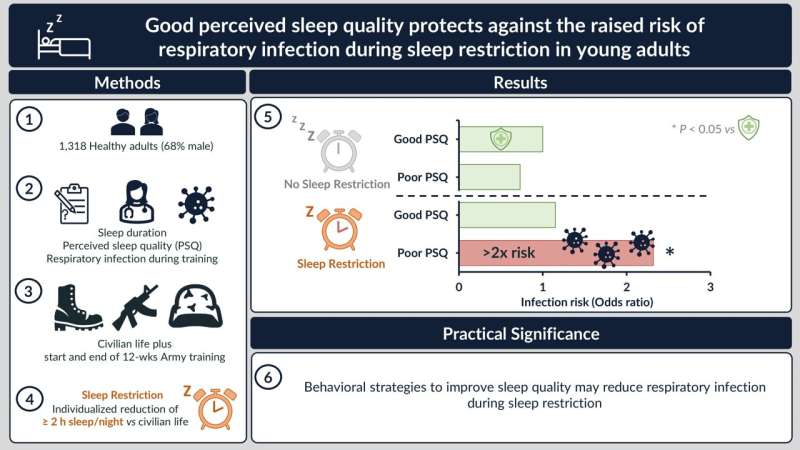When it comes to sleep, quality could be better than quantity

According to a new study published in the journal Sleep, adults restricting sleep by two or more hours each night are more likely to suffer respiratory illnesses like flu and colds, but only when they report poor sleep quality. Adults reporting good sleep quality were protected against respiratory illness even when sleep restricted.
Dr. Sam Oliver and Dr. Ross Roberts, Bangor University contributed to the research, led by former colleague, Professor Neil Walsh, now at Liverpool John Moores University.
Sam explained, "The findings were surprising; showing for the first time that quality of sleep has an important role in the risk of infection. Indeed, we showed that good quality sleep protects against the raised risk of infection when we get insufficient sleep."
Military 'wake up' calls
To delineate the restricted sleep, the team followed new military recruits, tracking their sleep patterns and health in the weeks before during basic training, when recruits follow strict "to bed" and "wake-up" times.
Over a thousand Army recruits recorded their sleep duration and quality during civilian life and at the start and end of 12 weeks training. Respiratory infections were diagnosed by a doctor during training.
On average, recruits slept two hours less during military training than civilian life. Despite this, over half of those with "sleep restriction" rated their sleep as good quality.
Recruits who slept for two hours less than was normal for them during training were three times as likely to suffer respiratory infection. This finding remained after accounting for factors that influence respiratory infection incidence, like season and smoking.
Living with little sleep
A deeper dive into the data revealed a striking finding—sleep restriction only increased respiratory infection in recruits reporting poor sleep quality. Good sleep quality protected against respiratory infection during sleep restriction.
Ross added, "Although the research was conducted with male and female military recruits, the findings have wider relevance as many people chose to or find themselves sleeping fewer than the recommended number of hours, due to late night or early morning work and family commitments."
More information: Neil P Walsh et al, Good perceived sleep quality protects against the raised risk of respiratory infection during sleep restriction in young adults, Sleep (2022). DOI: 10.1093/sleep/zsac222




















